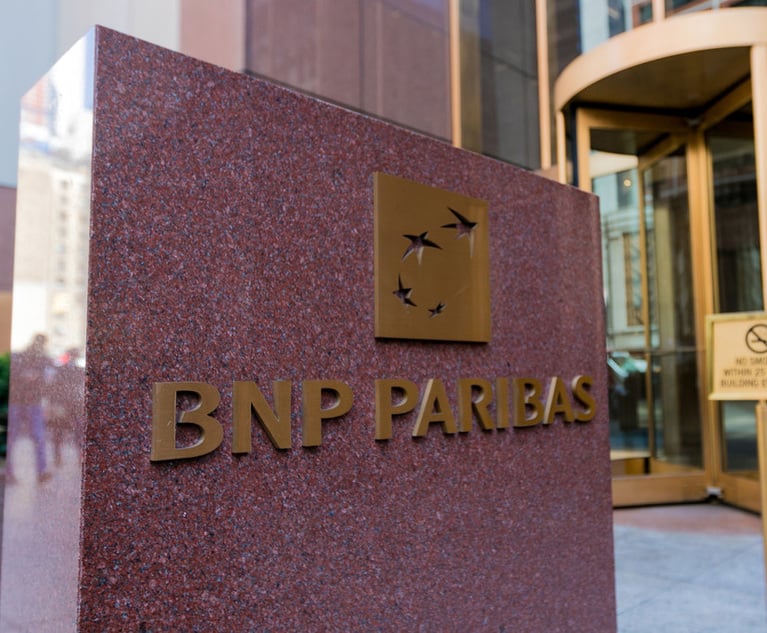 Barbara M. Goodstein
Barbara M. Goodstein Virtual Currencies (and Other Digital Assets) Under the UCC
In this edition of her Secured Transactions column, Barbara M. Goodstein examines the scope of UCC Article 9 with a focus on virtual currencies, taking into consideration issues of classification and perfection, but also how the Uniform Commercial Code and Emerging Technologies Committee is attempting to tackle these unsettled issues by modifying existing provisions and, in some cases, adding new ones.
August 04, 2021 at 12:30 PM
12 minute read
Virtual currencies continue to gain acceptance in commercial transactions. As a result, financial institutions are beginning to accept such currencies as collateral for financings. However, Article 9 of the Uniform Commercial Code (UCC) falls short of providing adequate guidance on how to create or perfect a security interest in these currencies. This uncertainty, and the consequent risks to lenders, are further exacerbated by the lack of helpful case law and non-uniform state laws. Recognizing this problem, the Uniform Law Commission and the American Law Institute in 2019 organized the Uniform Commercial Code and Emerging Technologies Committee (the Committee) to consider changes to the UCC intended primarily to address "digital assets" (a term used but not defined by the Code drafters), such as some virtual currencies. This article examines the scope of UCC Article 9 with a focus on virtual currencies, taking into consideration issues of classification and perfection, but also how the Committee is attempting to tackle these unsettled issues by modifying existing provisions and, in some cases, adding new ones.
What Is Virtual Currency?
Broadly speaking, virtual currency is a currency available only in electronic form. Currencies can be a government-authorized medium of exchange (see the UCC definition of "money" in §1-201(a)(24)), or they can exist through a decentralized system, with no central administrator controlling the currency supply. Decentralized currencies, which include Bitcoin, are not generated or supported by any central bank or other government agency; instead transactions are recorded through ledger entries across decentralized computer networks known as blockchains. Once verified, the transaction information becomes part of a permanent and unchangeable "block." Owners of the virtual currencies are able to transfer units of these currencies through the ledger system that records ownership and transfers, serving as a financial transaction database, which creates transparency among the various parties.
This content has been archived. It is available through our partners, LexisNexis® and Bloomberg Law.
To view this content, please continue to their sites.
Not a Lexis Subscriber?
Subscribe Now
Not a Bloomberg Law Subscriber?
Subscribe Now
NOT FOR REPRINT
© 2025 ALM Global, LLC, All Rights Reserved. Request academic re-use from www.copyright.com. All other uses, submit a request to [email protected]. For more information visit Asset & Logo Licensing.
You Might Like
View All
The CFPB Is Digging In for Last Days of Biden's Term. But What Happens Next?
6 minute read

NY AG James Targets Crypto Fraud Which Allegedly Ensnared Victims With Fake Jobs
4 minute read
'Merciless' Filing Deadline Dooms Cuban Americans' Property-Trafficking Suit Against BNP Paribas, SocGen
4 minute readLaw Firms Mentioned
Trending Stories
- 1How ‘Bilateral Tapping’ Can Help with Stress and Anxiety
- 2How Law Firms Can Make Business Services a Performance Champion
- 3'Digital Mindset': Hogan Lovells' New Global Managing Partner for Digitalization
- 4Silk Road Founder Ross Ulbricht Has New York Sentence Pardoned by Trump
- 5Settlement Allows Spouses of U.S. Citizens to Reopen Removal Proceedings
Who Got The Work
J. Brugh Lower of Gibbons has entered an appearance for industrial equipment supplier Devco Corporation in a pending trademark infringement lawsuit. The suit, accusing the defendant of selling knock-off Graco products, was filed Dec. 18 in New Jersey District Court by Rivkin Radler on behalf of Graco Inc. and Graco Minnesota. The case, assigned to U.S. District Judge Zahid N. Quraishi, is 3:24-cv-11294, Graco Inc. et al v. Devco Corporation.
Who Got The Work
Rebecca Maller-Stein and Kent A. Yalowitz of Arnold & Porter Kaye Scholer have entered their appearances for Hanaco Venture Capital and its executives, Lior Prosor and David Frankel, in a pending securities lawsuit. The action, filed on Dec. 24 in New York Southern District Court by Zell, Aron & Co. on behalf of Goldeneye Advisors, accuses the defendants of negligently and fraudulently managing the plaintiff's $1 million investment. The case, assigned to U.S. District Judge Vernon S. Broderick, is 1:24-cv-09918, Goldeneye Advisors, LLC v. Hanaco Venture Capital, Ltd. et al.
Who Got The Work
Attorneys from A&O Shearman has stepped in as defense counsel for Toronto-Dominion Bank and other defendants in a pending securities class action. The suit, filed Dec. 11 in New York Southern District Court by Bleichmar Fonti & Auld, accuses the defendants of concealing the bank's 'pervasive' deficiencies in regards to its compliance with the Bank Secrecy Act and the quality of its anti-money laundering controls. The case, assigned to U.S. District Judge Arun Subramanian, is 1:24-cv-09445, Gonzalez v. The Toronto-Dominion Bank et al.
Who Got The Work
Crown Castle International, a Pennsylvania company providing shared communications infrastructure, has turned to Luke D. Wolf of Gordon Rees Scully Mansukhani to fend off a pending breach-of-contract lawsuit. The court action, filed Nov. 25 in Michigan Eastern District Court by Hooper Hathaway PC on behalf of The Town Residences LLC, accuses Crown Castle of failing to transfer approximately $30,000 in utility payments from T-Mobile in breach of a roof-top lease and assignment agreement. The case, assigned to U.S. District Judge Susan K. Declercq, is 2:24-cv-13131, The Town Residences LLC v. T-Mobile US, Inc. et al.
Who Got The Work
Wilfred P. Coronato and Daniel M. Schwartz of McCarter & English have stepped in as defense counsel to Electrolux Home Products Inc. in a pending product liability lawsuit. The court action, filed Nov. 26 in New York Eastern District Court by Poulos Lopiccolo PC and Nagel Rice LLP on behalf of David Stern, alleges that the defendant's refrigerators’ drawers and shelving repeatedly break and fall apart within months after purchase. The case, assigned to U.S. District Judge Joan M. Azrack, is 2:24-cv-08204, Stern v. Electrolux Home Products, Inc.
Featured Firms
Law Offices of Gary Martin Hays & Associates, P.C.
(470) 294-1674
Law Offices of Mark E. Salomone
(857) 444-6468
Smith & Hassler
(713) 739-1250






